Agglomeration Economies Definition Human Geography

The Occupy Wall Street movement has drawn plenty of official heat and media light, and they're gaining momentum nationwide through social media. But the demonstrators' demands have remained hard to pin down. One organizer says that's by design: This is more of a brainstorming session than a protest.

Anthropologist David Graeber, who teaches at Goldsmiths College, University of London, is one of the more distinguished minds behind the national street movement to protest Wall Street greed. A longtime, committed anarchist, he traces his involvement back to July 2, when media company AdBusters called a meeting for the original Occupy Wall Street assembly–Graeber kind of hijacked it, peeling off a seed group to sharpen the approach and rapidly spread plans in the short amount of time between the assembly and the September 17 date set by AdBusters (A Saturday, by the way, when Wall Street was mostly vacant). We spoke earlier this summer about his new book, Debt: The First 5000 Years, and his ideas for life after default–all of which speak to the present-day goals of occupiers of streets and public spaces in a growing number of cities around the world.
FAST COMPANY: You started working on this giant world history of debt cycles and crises a few months before the financial crisis in 2008. How did you see it coming?
DAVID GRAEBER: A lot of us kind of knew. Everybody from [liberal economist] Dean Baker to [sociologist] Emmanuel Wallerstein had been saying, well, first goes the dotcom bubble and then the
housing bubble and then finally we'll have the dollar bubble and that's it for
the American empire. So far it's two out of three!
You do a really good job painting the financial crisis as just one in a long, long series–something that tends to happen, in ancient Babylon and early medieval Europe and so forth, when these big military empires get overextended and start printing money to cover their debts. And to get out of it, you say the answer was historically a clean slate, cancelling everybody's debts–not just bailing out the banks and restructuring sovereign debtors like Greece, but writing off individuals' mortgages and credit cards. How is that supposed to work?
Well, in
periods dominated by credit money, people understand that money is
ultimately a social arrangement, so it's much easier to adjust the
rules. And that's why I say jubilee [the Biblically ordained 50th year, in which all outstanding debts are written off]. If they can print money to give the banks, why can't they print money to give to me?
Sounds nice, but Congress seems to be firmly in the path of austerity, not amnesty.
What we're experiencing in America is a classic debt crisis. One or two percent of the population are ending up with all the money and becoming the financiers, and everyone else in America ends up becoming debt peons.
Hence, I guess, the "We are the 99%" slogans out there at the protests. So one of the most interesting concepts you introduce in the book is something called a "human economy." What is that?
I have a very specific, empirical thing in mind here. Money in pre-market or non-market societies exists to rearrange social relations between people.
Like to pay a dowry, or settle a blood feud.
Right. So a human economy is an economy where people recognize that money and stuff is never an end in itself. The idea is to have the best relationships and become the best person–which is of course true of any society, ultimately.
Okay, sounds nice, but how can that ideal coexist with the complex, highly productive market economy and institutions that we've built up?
We'll never have a society
where everything operates that way. That's the utopian mistake. But if the needs are great enough or the cost is small enough, we'll always behave communistically. Even in the internal operations of a corporation, like Apple, people are acting from each according to their ability, to each according to their needs. And even in the so-called free market, if someone's really rich or really poor, you take advantage of them or knock them a break.
So how do you make more space for that kind of humane or pro-human behavior?
The knowhow to create alternative institutions is easy to
find. One of the most abundant
resources on earth is smart, creative, imaginative people. And yet 99.9% of the power of the human
race is not being marshaled right now except to find something to eat. So all we need to do is open
up that spigot a little bit and we could come up with endless ways to create and produce
and distribute. That's what these assembly
movements are about: people sitting down and saying, here's how we can do this.
[Homepage image: Flickr user Mat McDermott]
Agglomeration Economies Definition Human Geography
Source: https://www.fastcompany.com/1785032/occupywallstreet-organizers-ideas-new-human-economy
0 Response to "Agglomeration Economies Definition Human Geography"
Post a Comment